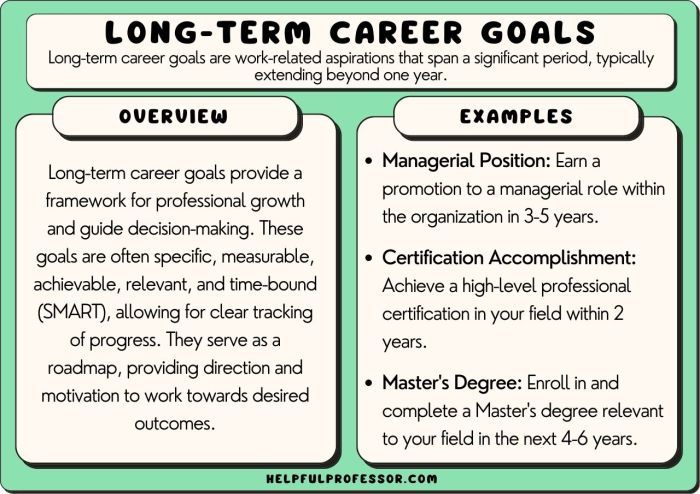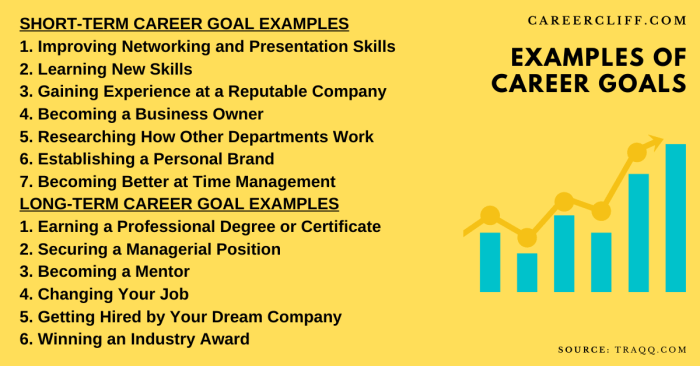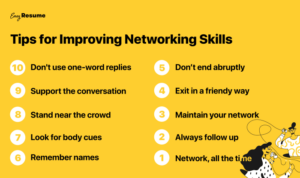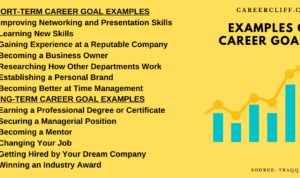Career Development Goals open doors to growth and success, keeping you driven and focused. Get ready for a journey filled with short-term wins and long-term victories, all tailored to your personal values and interests.
Learn how to set SMART goals, track progress, and celebrate milestones as you navigate the path to achieving your career aspirations.
Importance of Career Development Goals
Setting career development goals is crucial for professional growth as it provides individuals with a roadmap to success. By clearly defining objectives and milestones, individuals can track their progress and make necessary adjustments to achieve their desired career outcomes.
Stay Motivated and Focused
- Setting career development goals helps individuals stay motivated and focused in their careers by giving them a sense of purpose and direction.
- Having specific goals to work towards can increase productivity and drive individuals to push themselves beyond their comfort zones.
Increased Job Satisfaction and Fulfillment
- Clear career development goals lead to increased job satisfaction as individuals have a clear understanding of what they want to achieve in their careers.
- When individuals see progress towards their goals, it can boost their confidence and overall sense of fulfillment in their work.
Types of Career Development Goals

When it comes to setting career development goals, individuals can aim for both short-term and long-term objectives. It’s important to have a mix of skill-based goals and position-based goals to ensure a well-rounded approach to career growth.
Short-term Career Development Goals
- Complete a certification course in a relevant field within the next six months.
- Improve time management skills to increase productivity at work within the next three months.
- Enhance communication skills by attending a workshop or seminar within the next two months.
Long-term Career Development Goals
- Obtain a leadership position within the company within the next five years.
- Start a side business related to your field of expertise within the next three years.
- Attain a master’s degree in a specialized area within the next seven years.
Skill-based Goals vs. Position-based Goals
Skill-based goals focus on improving specific abilities or competencies, such as communication, technical skills, or leadership qualities. These goals help individuals enhance their overall skill set and become more valuable employees in any position they hold.
Position-based goals, on the other hand, are centered around achieving a specific job title, role, or level within an organization. These goals involve climbing the corporate ladder, taking on more responsibilities, and ultimately reaching a desired position within a company.
Both types of goals are important for career development, as skill-based goals help individuals grow professionally and adapt to different roles, while position-based goals give them a clear target to work towards and progress within their chosen field.
Strategies for Setting Career Development Goals
Setting effective career development goals is crucial for long-term success and personal growth. Utilizing the SMART criteria, aligning goals with personal values and interests, and breaking down complex goals into manageable steps are key strategies to ensure progress and achievement in your career journey.
SMART Criteria for Setting Goals
- Specific: Clearly define your career goals with specific details and objectives. For example, instead of saying “I want to advance in my career,” specify “I want to earn a promotion to a managerial position within the next two years.”
- Measurable: Establish measurable criteria to track your progress and success. This could include metrics like deadlines, milestones, or quantifiable outcomes.
- Achievable: Set realistic goals that are attainable with your current skills, resources, and opportunities. Stretch yourself, but ensure your goals are within reach.
- Relevant: Ensure your career goals align with your long-term objectives, values, and interests. Your goals should contribute to your overall career satisfaction and fulfillment.
- Time-bound: Set specific deadlines and timelines for achieving your career goals. This helps create a sense of urgency and accountability.
Aligning Goals with Personal Values and Interests
It is essential to align your career development goals with your personal values and interests to ensure motivation, engagement, and fulfillment in your professional pursuits. Reflect on what matters most to you, what drives your passion, and what aligns with your core beliefs. By setting goals that resonate with your values and interests, you are more likely to stay committed and dedicated to achieving them.
Prioritizing and Breaking Down Complex Goals
When faced with complex career goals, it is important to prioritize and break them down into smaller, actionable steps. Start by identifying the key components of your goal and then create a step-by-step plan to achieve each component. By breaking down your goals into manageable tasks, you can track your progress, stay focused, and overcome any obstacles that may arise along the way.
Tracking and Achieving Career Development Goals

Tracking your progress towards career development goals is crucial for several reasons. It helps you stay focused, motivated, and accountable. By monitoring your advancements, you can make adjustments as needed and ensure you are on the right path towards your desired career outcomes.
The Benefits of Tracking Progress
- Provides clarity on where you stand in relation to your goals
- Identifies areas for improvement and growth
- Keeps you motivated by showing tangible results
- Allows for timely adjustments to stay on track
Techniques for Staying Accountable and Motivated
- Create a detailed action plan with specific milestones and deadlines
- Share your goals with a mentor, coach, or accountability partner
- Use productivity tools or apps to track your progress daily
- Reward yourself for meeting milestones to stay motivated
Celebrating Milestones and Accomplishments
- Recognize and celebrate your achievements, no matter how small
- Reflect on the progress you have made and the challenges you have overcome
- Share your successes with others to inspire and motivate them
- Use milestones as checkpoints to reevaluate and set new goals




